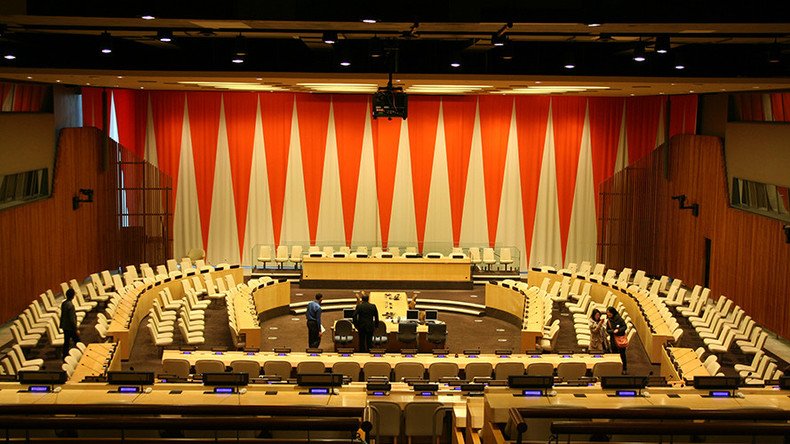UN Watch outraged as Saudi Arabia takes place on UN Women’s Right Commission

UN Watch, a human rights organization, monitoring the performance of the United Nations, has strongly condemned the appointment of Saudi Arabia to the UN Commission on the Status of Women (CSW), citing Riyadh’s poor women’s rights record and widespread gender inequality.
“Electing Saudi Arabia to protect women’s rights is like making an arsonist into the town fire chief. It’s absurd,” Hillel Neuer, the UN Watch chief, told RT. “Saudi Arabia has one of the world’s worst records on women’s rights.”
READ MORE: Saudi-led coalition ‘bombing hospitals, violating rights of children’ in Yemen – report
“Women are not allowed to drive a car in Saudi Arabia. Women require a guardian for their entire lives, from their birth until death; that means either their father, a husband, a son, has to approve of wherever they travel, whether it’s inside or outside the country,” Neuer said.
“This effectively leaves all critical decisions in the hands of men, other than the women themselves. And so the notion that Saudi Arabia would be elected to the highest body that protects women’s rights is just absolutely absurd.”
Under Saudi Arabia’s male guardianship system, adult women need permission from a male guardian – usually from a husband, father, brother, or son – to travel, marry, or exit prison. They may be asked to provide their guardian’s consent to work or access healthcare. Authorities have long been promising to abolish this rule, but it remains intact.
Saudi Arabia was elected by a secret ballot last week by the UN’s Economic and Social Council (ECOSOC), having 54 nations as members.
READ MORE: 2.2mn Yemeni children close to famine, 70% rise in those killed over past year – UNICEF
Saudi Arabia along with Iraq, South Korea and Turkmenistan has been elected for a four-year term, from 2018 to 2022, among the Asia-Pacific States.
At least 5 EU states voted FOR the Saudis.
— Hillel Neuer (@HillelNeuer) April 23, 2017
Belgium?
Czech?
Estonia?
Finland?
France?
Germany?
Greece?
Ireland?
Italy?
Portugal?
Sweden?
UK? pic.twitter.com/e4FPK1PgMB
Which 5 #EU countries voted for Saudi Arabia on the UN women's rights commission? Do they have the guts to admit it?https://t.co/8gKdrPVhrw
— Pat Condell (@patcondell) April 23, 2017
Twitter users, including Saudi Arabian women, were also quick to respond to the news.
@HillelNeuer@UN_CSW@UNECOSOC I wish I could find the words to express how I feel right know. I'm 'saudi' and this feels like betrayal.
— kh.oz (@khuludAu) April 23, 2017
Absurd! UN couldn't have done bigger injustice to women's cause
— Baqir Sajjad (@baqirsajjad) April 23, 2017
UN Elects KSA to Women's Rights body https://t.co/Nk2ecKmxc0 via @unwatch
Insane! Saudi Arabia is elected chieftain over women's rights by U.N? A country where women aren't allowed to drive? https://t.co/mZZHfQvXGa
— Luna Safwan (@LunaSafwan) April 23, 2017
Do I understand this correctly? Saudi Arabia is elected chieftain over women's rights by U.N? A country where women aren't allowed to drive?
— Yradur (@nacktepoesie) April 23, 2017
The CSW is aimed at "promoting women’s rights, documenting the reality of women’s lives throughout the world, and shaping global standards on gender equality and the empowerment of women," according to its website.
Saudi Arabia’s bid to be elected to the UN Commission on the Status of Women was made in September 2016. At the time, the country referred to its record on women’s rights protection, which goes “in accordance with Sharia, which guarantees fair gender equality.”
No joke: Saudi Arabia is running for the UN Human Rights Council—and their campaign brochure cites the Saudi record on. . . women's rights. pic.twitter.com/2xqO62V1GS
— Hillel Neuer (@HillelNeuer) September 22, 2016
Neuer explained that although the UN has protocols dating back to 2006 when its Human Rights Council was set up that outline the criteria by which countries may be elected, i.e. upholding and promoting human rights, in practice this was ignored by the backroom deals struck by Saudi diplomats. In October 2016, Saudi Arabia was re-elected to the UN Human Rights Council despite the backdrop of criticism from non-governmental human rights organizations.
Despite its recent appointment to the CSW, the decision can still be reversed, Neuer said.
“In the Human Rights Council a country that commits gross and systematic violations of human rights can be removed under a specific provision of its charter, and a number of [other] UN agencies have these rules,” he claimed. “So we call on the United Nations Human Rights Council to remove Saudi Arabia along with other countries such as Cuba, Venezuela, China, and Qatar. They should all be removed for their gross abuse of human rights.”
“We hope that the political will, will be found to remove Saudi Arabia, Venezuela, China, Cuba, and other countries from the Human Rights Council,” he added.












